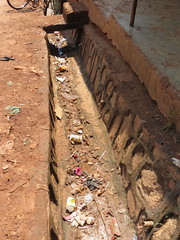As an Irish, light-haired girl from Chicago, I can count the number of times I’ve been tan on one hand. (In full disclosure, it’s only happened twice.) That’s changed here.
Every morning, I make my way from Naguru Hill to Kinawataka, where Benedicta works and lives. At about a mile-and-a-half, it’s a short walk. However, in the 20 minutes it takes me to walk to Kinawataka every day, I acquire a tan. My normally borderline-translucent skin takes on a slightly darker, brown color – at least until I get home and shower.
That’s because it’s not from the sun. Rather, the smog in the air cakes on my skin and gives me a one-of-a-kind Kampala spray tan. A woman I work with has labeled it my “pollution color.”
Kampala is a vibrant, growing town, full of people who are enterprising and kind. Sadly, its pollution is one of the first things you notice when arriving, and it sticks with you – quite literally.
Cars are the main culprits. With no public transportation, traffic is typically at a standstill, with cars and their emissions choking the highways and the air.
Trash is a close second. Recycling is non-existent. While most roads aren’t paved with stone, they’re paved in plastic bags and waste that have become hardened and caked in the roads. Straws, plastic bottles and grocery bags litter the streets and drainages. Walking around town without stepping in some kind of trash is strengthening my hopscotch skills.
As this trash piles up, it blocks the drains that line the streets. Because there’s no recycling, residents gather the trash and burn it, releasing harmful emissions into the air. And adding to my tan.
The pollution has already taken a toll on residents’ health. According to the World Bank, more than 25 percent of children under age 13 in Uganda have asthma, compared with just 10 percent in South Africa.
And the pollution is set to get worse. Government estimates project that Uganda’s population will almost double in the next 20 years, reaching 60 million people. Without a change in traffic, industry or waste management, that’s a guaranteed increase in pollution.
Benedicta and Kinawataka Straw Bags are working to change that. By taking discarded straws andrepurposing them into bags, the women of Kinawataka are reducing the straws that line the streets, keeping them from eventually being burned. With about 700 straws used for one bag, they’ve taken more than 2 million straws out of the environment. Also, many people use the bags for shopping, reducing the number of plastic bags used.
This summer, we’ll launch a pilot program, giving two local supermarkets free straw bags in exchange for not giving out plastic bags. We’re excited to get started and are hoping customers will be as well. While more inevitably needs to be done on a citywide basis to reduce the pollution, it will be a good start. And it demonstrates that Kampala citizens are committed to figuring out a solution.
After all, I’d choose healthy air over my “pollution color” any day.
Posted By Katie
Posted Jul 3rd, 2012




